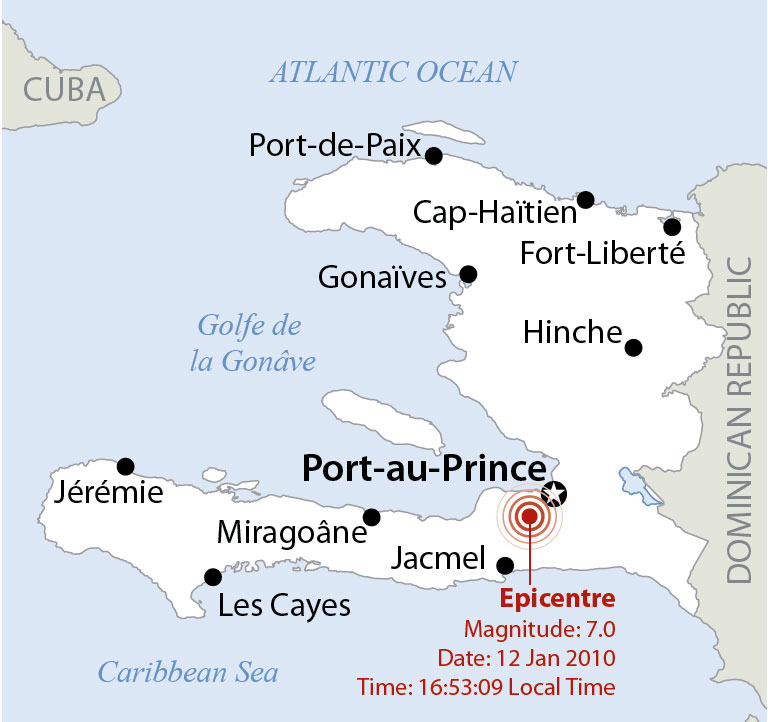
Setbacks loom for Haiti as hurricanes approach

Three months after Haiti’s devastating earthquake, authorities and aid agencies are facing the daunting task of getting the country back on its feet.
One of the most urgent priorities is better shelter for the 1.5 million homeless people at risk from the imminent rains and hurricane season, say Swiss aid officials.
Life is slowly returning to the capital Port-au-Prince after the 7.0-magnitude quake on January 12 that killed 230,000 people, injured 300,000 others and wrecked large swaths of the city.
The noise of heavy machinery can be heard as bulldozers rip down damaged buildings and clear rubble in the shattered city.
Aid officials say the humanitarian situation has improved significantly since the quake.
But even after the distribution of thousands of tents, tarpaulins and other emergency relief supplies, including millions of gallons of water and tons of food, people are still in desperate need in Port-au-Prince and nearby towns such as Leogane and Petit-Goave.
Toni Frisch, the deputy director-general of the Swiss Agency for Development and Cooperation (SDC), said outstanding needs were still “tremendous”.
“I have the impression that many people have underestimated what this earthquake means. Many problems have still not been resolved,” he told swissinfo.ch.
And with the onset of heavy rains from the beginning of May, followed by a forecast more-active-than-usual hurricane season, for many survivors life may well get worse before it gets better, said Switzerland’s top humanitarian official.
Flimsy homes
The main priority for many Haitians is finding a way to make a living and leave the cramped impromptu camps dotted around the capital.
In a survey carried out by the aid organisation Oxfam, 28 per cent of those polled said job creation should be the top priority of the reconstruction effort. Haitians said the next biggest priorities were building new schools and homes.
But President René Préval said the government’s immediate priority was to move the homeless to adequate shelter.
In Port-au-Prince 600,000 people are living under tarpaulins and plastic sheeting in over 400 vulnerable makeshift camps, which are growing in number and size as many who fled the capital return home.
Officials warn that the six-week-long rainy season could prove to be another emergency situation by worsening unsanitary conditions if no better living situations are provided.
To decongest the camps the Haitian government and the United Nations are encouraging people to move back to their old neighbourhoods where possible and have certified thousands of homes as safe to occupy.
And the first of 40,000 extremely vulnerable earthquake survivors, 9,000 of whom were living on river beds, were relocated last weekend in the capital as agencies scrambled to receive them.
Some aid groups criticised the Haitian government and the UN for being slow to set up alternative sites.
Ominous mountain
The Red Cross, which coordinates the 60 agencies providing shelter, is confident that by May 1 most of the homeless will have received tents, tarpaulins or wood – emergency shelter that won’t be able to resist hurricanes.
It says due to resources and priorities it is impossible to give all of Haiti’s earthquake survivors hurricane-proof dwellings before the storm season starts in June.
“The hurricane season is like Russian roulette – one might hit, one might not. But the rainy season is a dead cert,” said Alex Wynter, communications officer at the International Federation of Red Cross and Red Crescent Societies (IFRC).
“There is certain to be… a long series of minor disasters caused by the rainy season throughout the quake zone in the improvised settlements which we’ll have to do our utmost to mitigate.”
The IFRC is planning to set up warehouses in six strategic points around the country in order to rapidly distribute relief items to the population if a disaster strikes.
The relief agency also wants to create a command and communication centre ahead of the hurricane season.
“Our work has only just begun here. We’ve climbed to the top of a hill only to see the mountain looming ahead,” said Iain Logan, the IFRC’s head of relief operations in Haiti.
Simon Bradley, swissinfo.ch and agencies
Switzerland mobilised one of its largest-ever relief and rapid response teams of 70 people for the Haiti mission.
The first phase focused mainly on medical assistance (including 12 doctors working at the university hospital), providing 40,000-50,000 litres of water every day in the capital and shelter and relief items.
The government’s humanitarian aid unit sent three freight aircraft to the earthquake zone with more than 170 tons of aid goods – tents, tarpaulins, medicines, medical materials and non-food items – being distributed.
More than SFr57.8 million ($54.7 million) was pledged by the Swiss public to Swiss Solidarity, a fundraising charity led by the Swiss Broadcasting Corporation, swissinfo.ch’s parent company.
On March 24 the Swiss government announced that it would earmark SFr36 million in aid over the 2010-2012 period to help reconstruction in Haiti. This will come on top of SFr12 million of Swiss bilateral and multilateral contributions for Haiti to date.
Swiss aid will be used chiefly for reconstruction efforts and the restoration of basic infrastructure. The SDC plans to continue to provide temporary shelter while working on more permanent housing with the International Migration Office and other NGOs. It has also signed an agreement with the Haitian Health Ministry to rebuild Petit-Goave Hospital as well as three schools in 2010.


In compliance with the JTI standards
More: SWI swissinfo.ch certified by the Journalism Trust Initiative






























You can find an overview of ongoing debates with our journalists here . Please join us!
If you want to start a conversation about a topic raised in this article or want to report factual errors, email us at english@swissinfo.ch.